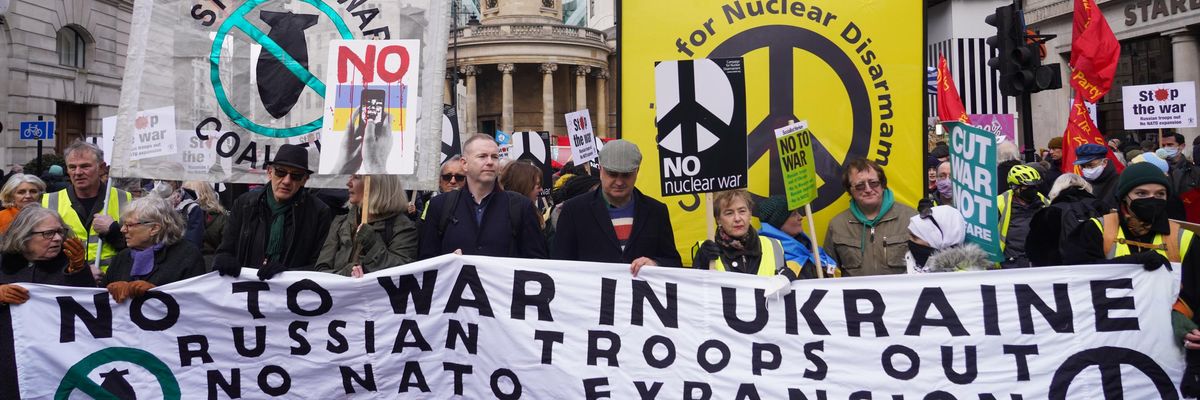The U.S. Senate on Thursday overwhelmingly voted to approve $40 billion in emergency military and humanitarian aid for Ukraine amid both Russia's ongoing invasion and warnings from peace advocates that prolonging the war makes the world a more dangerous, not safer, place.
"This war must be settled at the negotiating table, not on the battlefield!"
The Senate voted 86-11 in favor of H.R. 7619, a supplemental appropriations bill authorizing $7 billion more aid than requested by President Joe Biden. The package now goes to the president's desk for what is expected to be his swift approval.
Mirroring the measure's May 10 House vote--a 368-57 affair in which every dissenter was a Republican--all 11 "no" votes were cast by GOP senators.
Every member of the Congressional Progressive Caucus--99 House lawmakers plus Sen. Bernie Sanders (I-Vt.)--voted in favor of a measure that critics claim will not only prolong the war, but also dangerously provoke the world's other nuclear superpower and divert funds that could be better spent on programs of social uplift.
After U.S. officials last month pledged $700 million in military aid for Ukraine--less than 2% of the new package--Russian President Vladimir Putin's top diplomat accused NATO countries of "pouring oil on the fire" in Ukraine by "in essence, going to war with Russia through a proxy."
Russian Foreign Minister Sergei Lavrov--ignoring his country's brutal invasion of its sovereign neighbor--added that the risk of nuclear war is "serious" and "should not be underestimated," adding that "under no circumstances should a Third World War be allowed to happen."
Writing for Common Dreams after the House vote, Massachusetts Peace Action executive director Cole Harrison warned that "the danger of nuclear war has risen substantially during the Ukraine crisis, and escalations on the U.S. side are pushing us closer to the brink."
"Russia's invasion of Ukraine must be condemned. But the administration has been telegraphing for weeks that its war aims now go well beyond defending Ukraine," Harrison continued. "President Biden said that President Putin cannot remain in power. Secretary of Defense Austin said the U.S. seeks to weaken Russia. And Speaker Nancy Pelosi said that we are fighting until 'victory.'"
Cameron University political science instructor Stuart J. Hooper acknowledged in a Common Dreams opinion piece this week that "Russia should not have invaded Ukraine, and immediately lost any moral high ground it may have had upon doing so, and the Ukrainians had a right to defend themselves and seek help."
"But this situation is qualitatively different with its potential to ignite World War III," he cautioned. "With Russian forces clearly on the ropes after weeks in a stalemate, why was there not a significant effort to push for a peaceful withdrawal and resolution to the conflict?"
Hooper added: "Where was the Western attempt to seek compromise? Putin was willing to talk with French President Emmanuel Macron, why not use that line of communication to broker a way out? This is what an ethical hegemon, concerned with peace and stability, would do."
Noting that "in the face of war's atrocities, the tyranny of the immediate can be overwhelming and, for groups that have long opposed America's wars (and sometimes war in general), confusing," journalist Nan Levinson wrote this week that she hopes "there's more diplomacy going on behind the scenes than is now being reported and that realistic compromises on all sides, even hard-to-swallow ones, which will satisfy nobody, are being considered."
As Harrison stressed, "This war must be settled at the negotiating table, not on the battlefield!"





